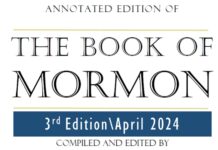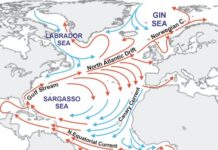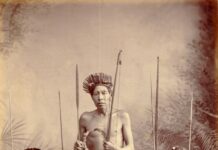Thoughts on the location of Book of Mormon Peoples
by Franklin Keel
 “First, I must say that, based upon the words of the Prophet Joseph Smith and my experiences with contemporary American Indians, I believe that the events of the Book of Mormon occurred in what is now the United States.
“First, I must say that, based upon the words of the Prophet Joseph Smith and my experiences with contemporary American Indians, I believe that the events of the Book of Mormon occurred in what is now the United States.
Having said that, I must also say that I also believe that Jesus Christ visited other people in this hemisphere and elsewhere (who, much like the Mulekites, were not descendants of Father Lehi) and taught them his doctrine. He speaks of this in 3 Nephi 16: 1-3:
1 And verily, verily, I say unto you that I have other sheep, which are not of this land, neither of the land of Jerusalem, neither in any parts of that land round about whither I have been to minister.
2 For they of whom I speak are they who have not as yet heard my voice; neither have I at any time manifested myself unto them.
3 But I have received a commandment of the Father that I shall go unto them, and that they shall hear my voice, and shall be numbered among my sheep, that there may be one-fold and one shepherd; therefore I go to show myself unto them.
These people undoubtedly would have preserved a record of His visits–depending on the culture– through stories, legends, or writings. (I also believe that it is reasonable that the other sheep of this hemisphere might have subsequently interacted and/or intermarried with the Nephite and Lamanite descendants.) Now, millennia later, when the posterity of those people learn of the Book of Mormon, it strikes a chord with their preserved ancestral memories, as intended by the Savior. That, with the assistance of the Holy Ghost, helps them know that our Church is true.
However, simply because they have those memories through legends, stories, or even written records of a bearded white god, does not require that they be related to the people who are chronicled in the Book of Mormon. Nor does it mean that because their ancestors were also visited by the Savior that the Book of Mormon events had to occur in their particular lands of inheritance. As I noted above, in addition to legends or other stories passed down orally, the other sheep may also have had written records of His visit to their ancestors. I think that this is borne out in 2 Nephi 29:11, 13, where the Lord says:
11 For I command all men, both in the east and in the west, and in the north, and in the south, and in the islands of the sea, that they shall write the words which I speak unto them; for out of the books which shall be written I will judge the world, every man according to their works, according to that which is written.
13 And it shall come to pass that the Jews shall have the words of the Nephites, and the Nephites shall have the words of the Jews; and the Nephites and the Jews shall have the words of the lost tribes of Israel; and the lost tribes of Israel shall have the words of the Nephites and the Jews.
To summarize, based upon the words of Joseph Smith and the Book of Mormon, I believe other peoples, not just Lehi’s posterity, were visited and taught by the Savior. But the events of Book of Mormon (Father Lehi’s posterity) happened in only one place—the land now known as the United States—where the Prophet Moroni led the young Joseph Smith to the Hill Cumorah. As these prophecies are fulfilled, other records will come to the fore because the Lord has spoken it.” Franklin Keel
M. Franklin Keel- A Great Example

M. Franklin Keel was born October 20, 1946, in Lawton, Oklahoma, to Douglas Keel, a Chickasaw career army sergeant and Christine Jefferson, who was half Choctaw and half Chickasaw. Reared in humble circumstances, Mr. Keel rose to represent Native Americans at the highest levels of government, and in the cultural and educational arenas, with integrity and distinction.
Mr. Keel graduated from Lawton High School and earned a bachelor’s degree from the Oklahoma College of Liberal Arts in 1968 before serving in the U.S. Air Force. He later worked as an administrative assistant with the U.S. Naval Weapons Laboratory.
In 1971, Mr. Keel became the first Native American commissioned as a Foreign Service Officer by the U.S. Diplomatic Corps. First assigned to the U.S. Embassy in Athens, Greece, he performed with distinction while representing U.S. interests overseas. Since then, he has mentored young Native Americans interested in pursuing a foreign affairs career.
Sparked by a desire to serve Native Americans, Mr. Keel graduated from Oklahoma City University Law School in 1978 and assisted Native Americans through his work with Legal Aid in Lawton. Building on his legal background and expertise in U.S. Indian policy, he was often invited to speak at universities and law schools across the country.
Mr. Keel was appointed to the Federal Senior Executive Service, the highest rank of the career U.S. Civil Service. In 37 years with the Bureau of Indian Affairs, he earned the highest ratings for superior performance in his roles promoting Native American interests on Capitol Hill as Congressional Liaison and as Director of the Office of Trust, Superintendent of the Concho Agency and Regional Director. In 1997, Mr. Keel was appointed as Director of the Eastern Region, Bureau of Indian Affairs. He received the Department of the Interior Outstanding Service Award for his leadership in directing aid to affected tribes after Hurricane Katrina. He served the 28 tribes of the largest and most diverse region until his retirement in 2014.
 In representing the Chickasaw Nation throughout his career, Mr. Keel’s international influence is unparalleled. He personally carried greetings from the Chickasaw Nation to foreign political leaders, including Prime Minister (now President) Erdoğan and Foreign Minister Gűl of Turkey, Deputy Minister Volgin of Russia, Lord Alderdice of England and Deputy Minister Nazimov of Azerbaijan, among others. He also acted as the sole U.S. representative at international meetings concerning indigenous peoples in Russia, Turkey, Canada and Mexico.
In representing the Chickasaw Nation throughout his career, Mr. Keel’s international influence is unparalleled. He personally carried greetings from the Chickasaw Nation to foreign political leaders, including Prime Minister (now President) Erdoğan and Foreign Minister Gűl of Turkey, Deputy Minister Volgin of Russia, Lord Alderdice of England and Deputy Minister Nazimov of Azerbaijan, among others. He also acted as the sole U.S. representative at international meetings concerning indigenous peoples in Russia, Turkey, Canada and Mexico.
His legal and policy expertise grounded the decisions and actions that define his extraordinarily successful career and legacy.
Franklin Keel, Colorado Springs, Colorado
During his distinguished career, Mr. Franklin Keel has honorably represented Native Americans with integrity and distinction at the highest levels of government.
In 1971, Mr. Keel became the first Native American commissioned as a Foreign Service Officer by the U.S. Diplomatic Corps.
In 1997, Mr. Keel was appointed as Director of the Eastern Region, Bureau of Indian Affairs. He served the 28 tribes of the largest and most diverse region until his retirement in 2014.
Gov. Anoatubby said that Mr. Keel had a profound impact on Native Americans.
“For much of his career, Mr. Keel mentored young Native Americans interested in foreign affairs and spoke at universities around the nation about U.S. Indian policy.”
“Mr. Keel, for your many years serving Native American communities and for being an inspiration to the next generation of Native Americans involved in law and foreign affairs, we thank you.”
Mr. Keel said he was honored and humbled for the honor, and proud to inducted into the Chickasaw Nation Hall of Fame.
“Today is a day of gratitude for me. I am grateful to the Chickasaw Nation for this high honor.”
Brother Keel has been an HP Group Leader, EQ President, Stake Sunday School President, and Counselor in a Branch Presidency, and is a convert to the Church.

 In the Annotated Book of Mormon by David Hocking and Rod Meldrum there are over 30-40 pages about the wonderful Native Americans of the Book of Mormon. Pictures, articles, notes, graphs, maps and important stories about the descendants of the Lamanites.
In the Annotated Book of Mormon by David Hocking and Rod Meldrum there are over 30-40 pages about the wonderful Native Americans of the Book of Mormon. Pictures, articles, notes, graphs, maps and important stories about the descendants of the Lamanites.
See examples pages here
Purchase Book of Mormon here
See More information and videos of Franklin here: https://hof.chickasaw.net/Inductees/2017/Franklin-Keel.aspx





